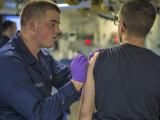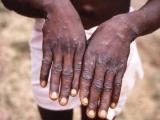Mar 28, 2003 (CIDRAP News) A 55-year-old National Guard member died of a heart attack Mar 26, 5 days after getting a smallpox shot, a Department of Defense official reported today.
The man became the third person in recent weeks to suffer a fatal heart attack not long after receiving a smallpox shot. But an autopsy showed the man had underlying coronary artery disease (CAD), and at this point his death is deemed unlikely to have been related to the smallpox shot, said Col. John Grabenstein of the Army Surgeon General's Office.
Grabenstein reported the case during a telephone conference of federal immunization experts, including the Advisory Committee on Immunization Practices (ACIP), the Smallpox Vaccine Working Group, and several cardiologists. The group met today to advise the Centers for Disease Control and Prevention (CDC) on steps to take in view of recent heart problems in smallpox vaccinees.
CDC reported this week that five healthcare workers have suffered heart attacks or angina, in two cases fatal, soon after getting a smallpox shot. In additon, 10 military personnel and two civilian healthcare workers have had heart inflammation (myocarditis or pericarditis) after getting the shot, though all have recovered or improved. As a result, CDC recommended Mar 25 that people with known heart disease avoid vaccination for now.
At today's meetingto which reporters were allowed to listenthe ACIP decided to recommend that the vaccination program exclude not only people with known heart disease but also those with three or more major risk factors for CAD. This approach would have excluded all the civilian vaccinees who recently suffered myocardial infarctions (MIs), a CDC official said.
Grabenstein told the group that the National Guardsman suffered cardiac arrest Mar 25 and was hospitalized for intensive treatment but died on the evening of the 26th. An autopsy showed that he had three-vessel CAD and a previous MI but no evidence of heart inflammation. "At this stage of the investigation we are categorizing this [death] as unlikely to be due to smallpox vaccination," but investigation is continuing, Grabenstein said.
He said the Army had 24 ischemic cardiovascular deaths per year in the past 4 years, and therefore the case "fits well within" the expected rate among military personnel. However, he also said the 10 cases of myocarditis or pericarditis among 240,000 military personnel getting their first smallpox shots is higher than expected. About 350,000 service members have been vaccinated so far, and there have been no cardiac inflammation cases among the 110,000 previously vaccinated members, he said.
The immunization experts discussed three possible precautions for the CDC to use while it investigates possible links between smallpox vaccine and heart disorders: (1) exclude from vaccination only those with known heart disease; (2) exclude those with known heart disease or three or more major CAD risk factors, such as hypertension, high blood cholesterol, and diabetes; (3) exclude both of the above groups, plus everyone aged 50 or older.
CDC officials said the first option would mean excluding an estimated about 5% of healthcare workers from the vaccination program, the second option would exclude about 6%, and the third would exclude about 25%.
"These options would presumably be temporary, only until we have a better understanding of the relationship" between the heart problems and the vaccine, said ACIP Chairman John F. Modlin, MD, of Dartmouth Medical School.
Another committee member, Paul A. Offit, MD, of Children's Hospital of Philadelphia, suggested a fourth option: suspending the whole civilian vaccination program while authorities gather more information. "There are a lot of people with heart problems out there," he said. But the suggestion drew little support.
Committee members generally echoed the view of CDC officials that the MI and angina cases in vaccinees may be coincidental because the numbers are so low. They voiced concern that excluding everyone over age 50 would cripple the program, which has proceeded far more slowly than expected.
"We have to look at the law of unintended consequences, and going to the extreme of eliminating those over age 50, we're essentially going to put an end to the vaccine program as it's rolling out," said Lucy S. Tompkins, MD, PhD, of Stanford University.
Committee members also expressed concern that excluding people 50 and over would force the vaccination program to focus on younger, previously unvaccinated workers, who could be at risk for myocarditis. "I think we're convinced that myocarditis in the younger vaccinees is causally related, where we have little or no evidence that the ischemic disease is causally related. If we go to the younger vaccinees, we're accepting a higher risk of myocarditis," said Margaret B. Rennels, MD, of the University of Maryland.
Guthrie S. Birkhead, MD, a committee member from the New York State Department of Health in Albany, said, "Option 2 would strike the balance between being fair and almost bending over backwards and being able to achieve some level of preparedness."
See also:
Previous CIDRAP reports
"Link between smallpox vaccine and myocarditis looks more likely"
"CDC tells heart patients to avoid smallpox shots for now"
ACIP page on CDC site
http://www.cdc.gov/nip/ACIP/default.htm



















